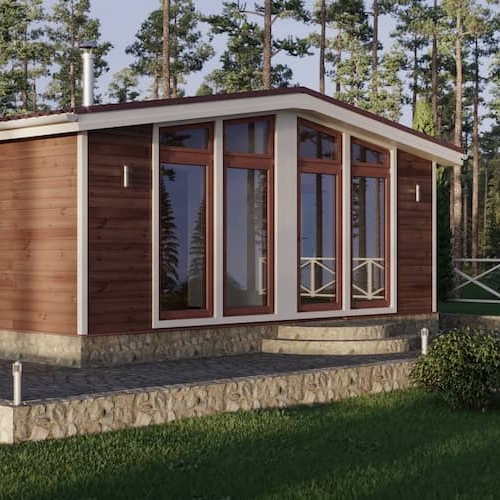Modular vs. manufactured homes: What's the difference?
Oct 23, 2024
•6-minute read

Modular and manufactured homes are two types of housing that are generally more affordable than traditional site-built homes. Understanding the key differences between these property types is essential for anyone interested in learning more about how to buy a house.
Explore how modular and manufactured homes are different, so you can determine whether one of these options is the right fit for you.
What is a modular home vs. manufactured home?
Modular and manufactured homes are prefabricated structures, meaning they’re partially or fully constructed in an off-site factory.
The primary difference between modular and manufactured homes is that modular homes are held to the same local, state and regional building codes required for on-site homes. Manufactured homes are held to a federal code set by the Department of Housing and Urban Development (HUD) and can be moved from one location to another.
Modular home defined
Like a traditional home, a modular home is placed on a permanent foundation. The construction of a modular home must comply with local building codes and standards in the area where the home will sit. The house is partially constructed in a factory and shipped to the homeowner’s lot.
Modular homes come in all shapes and sizes. In many cases, it’s hard to tell the difference between a modular home and a traditional stick-built home. Similar to standard homes built on-site, modular homes fluctuate in value with the traditional housing market.
Most banks and mortgage lenders offer financing on modular homes, which means that buyers will have a more diverse range of options when it’s time to purchase their home.
Manufactured home defined
Often called a mobile home, a manufactured home is built in a factory or warehouse in accordance with building codes set by HUD. This type of home is then transported from the factory to the home site – either in sections or as a whole – and installed on a temporary or permanent foundation.
Modern manufactured homes can come in three general floor plans:
- Single-wide: A home built as one long section
- Double-wide: Two sections joined to make a larger home (This model is popular with first-time home buyers.)
- Triple-wide: A less common model with three sections joined together for a larger, more spacious home
Rocket Mortgage® offers financing for manufactured homes built on a permanent structure on or after June 15, 1976 – the date the HUD code setting federal safety standards on manufactured houses went into effect.
Mobile vs. manufactured and modular homes
“Mobile home” and “trailer” are often used to describe modern manufactured homes, but the terms are a little outdated. Manufactured homes are typically referred to as mobile homes because they are built in a factory and generally don’t have a permanent foundation. Rather, they’re constructed on a steel chassis that can be affixed to land.
Manufactured homes can also be transported from one place to another, so they’re considered “mobile” in nature.
What’s the difference between modular and manufactured homes?
While both manufactured and modular homes are cost-effective alternatives to traditional site-built homes, they have some key differences.
If you have your heart set on a site-built home but want to take a more cost-conscious and efficient approach, a modular home build might be the way to go. Once modular homes are assembled, they’re essentially the same as site-built homes, sitting on a permanent foundation.
While both modular and manufactured homes are built in factories, manufactured homes must uphold federal guidelines thanks to the 1974 passage of the National Manufactured Housing Construction and Safety Standards Act, which authorized HUD to establish construction standards for manufactured homes. These safety standards, known as the HUD code, apply to the following aspects of manufactured homes:
- Quality and design
- Durability
- Safety
- Fire resistance
- Energy-efficiency
- Affordability
Any manufactured homes built before June 15, 1976, don’t comply with HUD code, which transformed the term “mobile home” into the upgraded, modern manufactured homes that you see today.
Modular vs. manufactured homes: An at-a-glance comparison
Compare modular and manufactured homes based on various structural features highlighted in the table below.
|
|
Modular homes |
Manufactured homes |
|
Construction |
Multiple factory-made pieces assembled at home site |
Built in sections, can be single- or multi-width |
|
Foundation |
Permanent/traditional |
Steel chassis that can be affixed to land |
|
Mobility |
No |
Yes |
|
Real property |
Considered real property once completed on-site |
Must be permanently affixed to the site, then converted from chattel to real property through the county |
|
Financing options |
Standard |
Limited |
|
Relative customizability |
High |
Moderate |
|
Code requirements |
Local, state and regional codes |
Federal HUD code |
|
Home site |
Private property |
Private property or land-lease |
Modular home vs. manufactured home: Pros and cons
As you weigh your options, consider the advantages and disadvantages of modular homes and manufactured homes.
Pros and cons of modular homes
|
Pros |
Cons |
|
Flexibility to customize: If you want to customize your home, modular homes offer plenty of options. |
High installation costs: In addition to the home, you’ll likely need to pay for electrical, plumbing and ductwork.
|
|
Speedy construction: Modular homes tend to come with a shorter construction timeline than traditional site-built homes.
|
Being limited to factory options: While there’s some latitude for customization, modular home customizations are limited to what the factory can provide.
|
|
Affordability: Modular homes are usually a more affordable option than stick-built houses.
|
|
Pros and cons of manufactured homes
|
Pros |
Cons |
|
Affordability: Manufactured homes tend to be significantly more affordable than traditionally built homes. |
Possible depreciation: Manufactured homes are more likely than traditional builds to depreciate over time. |
|
Quick construction: In general, manufactured homes take less time to construct. |
Limited customization: Although some modifications are possible, manufactured homes tend to offer limited customization options to homeowners. |
|
Streamlined maintenance: With limited customizations, you can usually find parts to replace issues that arise in the house.
|
|
Customizing modular and manufactured homes
Modular and manufactured homes can be customized – at least a bit – to fit your needs. Explore some of the ways you can design your modular or manufactured house.
Modular home designs
Modular home plans come in all shapes and sizes, from tiny homes to two-story colonials. A modular home can have many custom features, including an attached garage, a wrap-around porch and a floor plan of your choosing.
Manufactured home designs
Manufactured homes have also come a long way from the basic single- and double-wide days. While newer manufactured homes may not be as customizable as modular homes, they still come in various architectural styles and with floor plans and add-ons that can meet your needs.
Financing modular vs. manufactured homes
Mortgage loans are secured by real estate or land, plus the permanent fixtures that are built on the land. Modular homes are placed on a permanent foundation. Once assembled, a modular home is treated exactly like a site-built home, meaning it can be financed with a traditional mortgage.
Financing a manufactured home is a little more complex. The difference between a mortgage to buy a modular versus a manufactured home lies in the legal definitions of real property and personal property.
Essentially, personal property is movable property and real property is immovable property. Real property includes land and anything attached to the land. Some lenders don’t finance the purchase of a manufactured home because the land on which it sits is generally rented, and the home itself can be moved. So, manufactured homes often aren’t considered real property.
While manufactured homes are commonly financed with a conventional loan, FHA or VA loan financing may be available.
Keep in mind that Rocket Mortgage offers financing on manufactured homes built on or after June 15, 1976, that are permanently affixed to real property and have a HUD tag.
Zoning laws for modular and manufactured homes
Modular homes are subject to the same zoning laws as site-built homes, likewise making them more like traditional homes than are manufactured homes.
Manufactured homes are constructed according to a code administered by HUD. The foundation for manufactured homes also depends on local building codes. With zoning, local ordinances on land use can restrict where manufactured homes are placed.
For example, if a manufactured home is built for a specific state and the buyer cancels their order, the home may need to be resold to a buyer in that state.
The bottom line
If you’re deciding between a modular home and a manufactured home, it’s important to be aware of how the two differ and how they’re alike. Finding a house that will appreciate over time and that has a lot of options for upgrades and expansion is possible with the purchase of a modular home.
However, if you’re more interested in saving money and having the ability to move your house from one place to another, a manufactured home may be the better choice for you.
Thinking about financing a manufactured home and ready to move forward in the home buying process? Start an application online today.

Carey Chesney
Carey Chesney is a Realtor®, the co-owner of Chesney Team Realtors, and a contributing writer for Rocket. His writing focuses on the real estate landscape including home buying/selling, investment properties, and commercial real estate. Carey received his Bachelor's in English at University of Wisconsin-Madison and his Masters in Integrated Marketing & Communications at Eastern Michigan University. He lives with his wife and 3 children in Ann Arbor, Michigan.
Related resources
5-minute read
What is an accessory dwelling unit, or ADU?
An accessory dwelling unit is a separate living space located within your home or on your property. Find out more about ADUs and how one might work for you.<...
Read more
6-minute read
Kit homes: What you should know before buying
Kit homes are mail-order homes delivered in parts and built right on your property. Explore the pros and cons of building one and how much it could cost you.
Read more

6-minute read
How much does a tiny home cost?
The tiny house movement is growing in popularity, but how much does a tiny home cost? Learn about the factors that impact pricing in this complete guide.
Read more